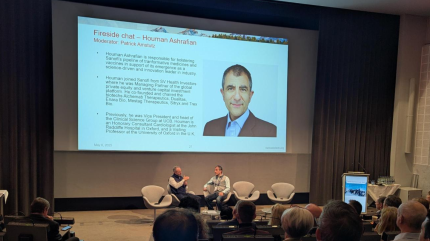
At a time when the biotech sector has been struggling with a lack of investment, some companies have had to make decisions to change trial designs, whether that be reducing the number of patients or changing the observation times.
Speaking during a fireside chat at Swiss Biotech Day 2025, which took place 5–6 May in Basel, Houman Ashrafian, executive vice president and head of Research and Development (R&D) at Sanofi, said that while it may seem a good idea to “squeeze a clinical trial” to keep a company running for longer, this could end up shutting the company down even quicker.

Discover B2B Marketing That Performs
Combine business intelligence and editorial excellence to reach engaged professionals across 36 leading media platforms.
“Don’t mess up the clinical trial. It’s critically important…Doing the wrong trial with your asset will kill it very quickly.” In the case of some trial failures, an additional $3–$4m investment to power the trial correctly and run it efficiently, could have led to transformative results, he said. “There are companies that are on the public markets who recently announced trials that came within a p-value of 0.07, and it tanked their share price. If they had run the trial for two more months and enrolled five, maybe 10 more patients, it could have been very different.”
While some companies have been struggling to balance their finances, Ashrafian believes that it is not a completely negative thing that biotech has had to tighten its belts since the 2021 boom, as some companies made very surprising financial decisions at that time.
“We went through years where biotech got better and better funding. Preclinical companies received vast amounts of revenue and some even went public. For me, that is the definition of madness where you expose yourself like that, but I was also one of those. The lure of liquidity meant that we wanted to rush [to] the public market. Those companies were the first ones to experience real pain when there was scrutiny,” Ashrafian said.
Sanofi has a venture capital (VC) arm, which provides funding to biotechs to run clinical trials. Ashrafian invited biotech companies to look into such options to ensure they run the most effective trial to get their asset through early stages of development, after which a pharmaceutical company could pick it up to complete the final development.

US Tariffs are shifting - will you react or anticipate?
Don’t let policy changes catch you off guard. Stay proactive with real-time data and expert analysis.
By GlobalData“Biotech produces molecules at a significant discount to pharma. Chemistry, Manufacturing, and Controls (CMC) may not be as good, but biotech [companies] get the molecule through Phase I, and they do that beautifully. But actually, the trial that determines the exit financing round is often not done as well. That’s where we come in with finance and expertise,” concluded Ashrafian.
Note: Some travel expenses that allowed the Clinical Trials Arena reporter to attend the Swiss Biotech Day conference were covered by the investment agency Switzerland Global Enterprise.




